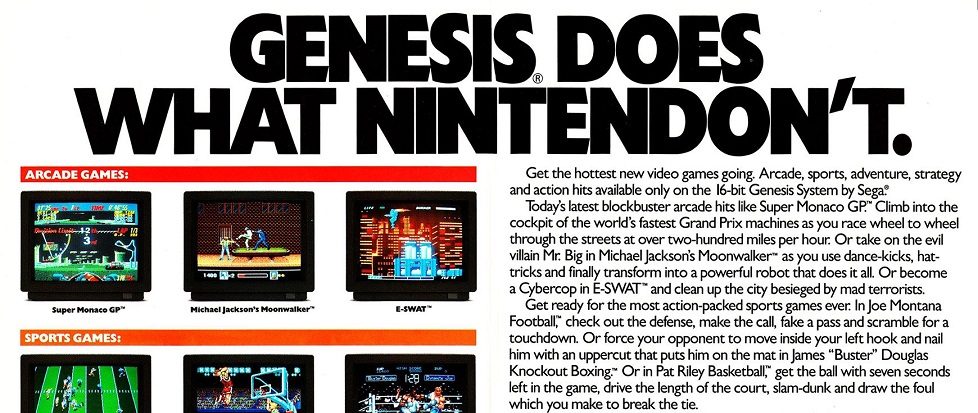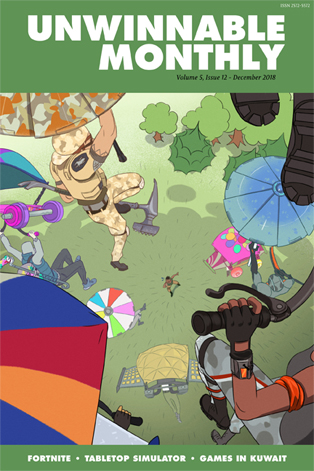
At Least Videogame Advertising Has Grown Up
 This column is reprinted from Unwinnable Monthly #110. If you like what you see, grab the magazine for less than ten dollars, or subscribe and get all future magazines for half price.
This column is reprinted from Unwinnable Monthly #110. If you like what you see, grab the magazine for less than ten dollars, or subscribe and get all future magazines for half price.
———
Where videogames meet real life.
———
We’re deep in the midst of the holiday shopping season, and that means we’re also eyeballs-deep in the heaviest advertising buys we’ll see all year. For its part, the videogames industry (which will be worth a projected $138 billion by the end of 2018), which revolves its existence around Q4 sales, will have revived its annual tradition of loading up the year’s biggest releases around the holidays and promoting the hell out of every single one until you’re seeing Call of Duty in your damn sleep. It isn’t the industry’s fault that Western capitalism decided up to 30% of retail sales should happen at the end of the year, but it does mean if your game is coming out between September and December, it needs marcomm muscle.
Videogames are more than just consumer products, of course. But if their creators are going to eat, they have to make profits in a competitive marketplace and that requires aggressive advertising to stand out.
This has been the case since effectively forever, but back in the day (which is to say, the 1990s), that often meant blasting your competition with as much open disrespect as you could fit into a two-page spread or 30-second TV spot. Today though, it’s clear something’s changed, moving away from faux edginess and toward something that looks like respect for its audience. For evidence, we need to look no further than classic games magazines to see that maybe boring marketing makes for a better experience overall.
This isn’t to say ads are never entertaining or that the industry sucks at promoting itself (neither of those points are true). However, where companies used to take each other down with a level of ferocity you’d expect from 14-year-olds on social media, their barbs have been filed off in favor of promoting wares based on their relative merits (an insane idea, to be sure). Instead of taglines like the infamous “Sega Does What Nintendon’t” that positioned the Genesis as an edgier alternative to the Super Nintendo, we see things like “Live In Your World, Play In Ours” or “Xbox is the Best Place to Play.”
Not as entertaining as Sega trying to cast Nintendo systems as nerd boxes for losers, but fair enough.
It wasn’t just major console manufacturers who once used advertising to put their competition on blast either. Even flagrant copycat games would go hard against rival titles, promising to make you stronger, smarter, or somehow more fulfilled as a human being if you’d just buy their generic clone of whatever popular franchise. Scan through copies of 1990s games magazines via The Computer Magazine Archives, and it’s easy to find plenty of examples of virtual nobodies taking comically combative shots at much more popular games and consoles, only to be flatly crushed and relegated to the bargain bin of history.
Taking a look at the December 1995 issue of Next Generation, there’s an ad for the Panasonic 3DO highlighting the sexual and violent content of a half-dozen titles no one remembers with the tagline “We Got It. They Don’t.” In retrospect, it’s not clear what they actually had other than clichés and a failing business model. In their defense though, it fits with all the other sexist and jingoist ads in the magazine.
Another spot for the full-motion video adventure game Psychic Detective, though, ups the ante by calling out its entire godforsaken genre stating, “Yeah, we know full-motion videogames in the past sucked.” Unfortunately, people thought Psychic Detective sucked too, getting a 4.7 out of 10 from Gamespot and a 2 out of 10 from IGN. In the same publication’s April 1996 issue, a full-page ad for Impact Racing claims, “Speed isn’t all you need.” That’s a clear shot at Need For Speed, a franchise that now spans 23 entries, selling over 150 million copies. Meanwhile, a used copy of Impact Racing (which received no sequels) now goes for $3.43 on Amazon.
[pullquote]This kind of absurdly overconfident shit-talking doesn’t happen like that much anymore.[/pullquote]
This kind of absurdly overconfident shit-talking doesn’t happen like that much anymore. When it does, like the time Sony made fun of DRM on the Xbox One, it’s noteworthy because it looks and feels out of character. When Sony would later refuse to open up cross-platform play for Fortnite on the PlayStation 4, felt so out of touch with what’s expected today that they were ultimately browbeaten into giving in.
Instead of punching the competition in the mouth (whether or not you have the muscle to follow through), the go-to marketing approach today is sometimes less outwardly entertaining but ultimately better for everyone involved: you just make your stuff better and then tell people about it through splashy conference keynotes and social media savvy. Those claims are most often backed up by material improvements too (even if reading between the PR lines is generally necessary), like Sony’s deal with Bungie to always have the most complete version of Destiny, or Microsoft responding to declining market share by releasing the most powerful home console with the Xbox One X.
Beats trying to verbally kick Kaz Hirai in the dick and just leaving it at that.
From the outside, this shift over time looks like an effort to grow up and be taken seriously (though the industry still has a long way to go on that front). In an era where #brands openly beef with each other on Twitter, gaming companies wisely appear content to avoid creating controversy on purpose (they have more than enough to handle between rampant labor abuses, systemic sexual harassment and anti-consumer scandals anyway).
Plus, social media and video streaming platforms give players a global, always-on platform to vent their frustrations. When failing to live up to hype has consequences that are easily visible in just a few clicks, companies have to be smarter about what they say and how they say it. Now, it really is a put up or shut up environment where directly taking down other companies is liable to backfire (though the Twitter account for the Bubsy reboot was, if nothing else, semi-amusing and in the spirit of the also-ran 90’s mascot platformer).
Now, when we go to the store (or online) to pick out games for the holidays, those games are better, the effort that goes into making them better is stronger, and the marketing behind them insults our intelligence less than it once did. And as this trash planet prepares to wrap up one more trip around the sun, maybe that’s one small consolation we can claim.
———
Ben Sailer is a writer based out of Fargo, ND, where he survives the cold with his wife and dog. His writing also regularly appears in New Noise Magazine.




